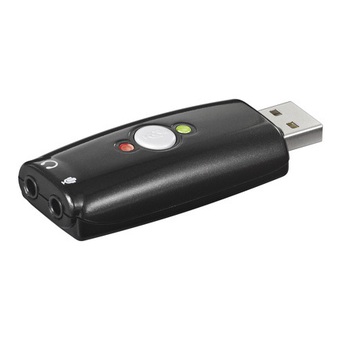3d Sound Usb Driver Ubuntu Linux


It works great on Ubuntu and Trisquel GNU/Linux. Supports plug and play. This device also works without proprietary binary blobs or drivers (and works with 100% open source software drivers). Verified purchase: Yes Condition: New. By aviloriaMay 26, 2016. Top critical review. Mic good, Playback sound not so much.
Mic good, Playback sound not so much. Using my Logitech g230 on an old laptop, made my mic sound 10 times better while on skype and recording, Playback sound/headset/speaker on the other hand, sound only came out of my left side. Thought it was a problem on my end but after tinkering on the sound settings it was definitely the sound adaper, I have to plug the adapter in a usb port next to my laptops headset plug and plug the headset jack from my g230 into the laptop itself to get left and right sound. Airfoil Keygen Cracking there. Too late to return and so cheap why bother, so got the 3D sound one instead, works like a charm. Maybe I got a faulty one? Still would use it. Verified purchase: Yes Condition: New •.
Contents • • • • Introduction Most modern Linux distributions use a hot-pluggable architecture for USB devices. This is very useful for everyday use, but it becomes difficult for pro-audio use, as ALSA device numbers (hw:X) are not stable across reboots, or even when removed and reinserted. This means that Jack has to be reconfigured after every restart or change. This document describes a method of maintaining ALSA device numbers for USB devices, including MIDI devices. It is not intended for beginning users, as the configuration is relatively arcane. Preparation Ensure that all of your USB audio devices are connected and detected by ALSA. Do this in a terminal by executing the command: foo@bar:~$ cat /proc/asound/cards My configuration is copied below.
0 [Intel ]: HDA-Intel - HDA Intel HDA Intel at 0xefffc000 irq 20 1 [BCR2000 ]: USB-Audio - BCR2000 BEHRINGER BCR2000 at usb-0000:00:1d.3-1, full speed 2 [default ]: USB-Audio - USB Audio CODEC Burr-Brown from TI USB Audio CODEC at usb-0000:00:1d.3-2, full s 3 [U0x46d0x8c6 ]: USB-Audio - USB Device 0x46d:0x8c6 USB Device 0x46d:0x8c6 at usb-0000:00:1d.7-5, high speed 4 [U49 ]: USB-Audio - USB Axiom 49 M-Audio USB Axiom 49 at usb-0000:00:1d.0-2, full speed The first column is the ALSA device (major) number. In this case, on my laptop i have the following: • device 0 (hw:0) is the inbuilt Intel High Definition Audio chipset. • device 1 (hw:1) is a Behringer BCR2000 MIDI controller • device 2 (hw:2) is a Behringer UCA202 soundcard • device 3 (hw:3) is the laptop's inbuilt microphone • device 4 (hw:4) is an M-Audio Axiom 49 MIDI keyboard Take note of your configuration. Now, in the same terminal, execute the following: foo@bar:~$ lsusb My configuration is copied below: Bus 004 Device 001: ID 0000:0000 Bus 005 Device 003: ID 1397:00bc Bus 005 Device 002: ID 08bb:2902 Texas Instruments Japan Bus 005 Device 001: ID 0000:0000 Bus 002 Device 003: ID 0763:0199 Midiman Bus 002 Device 002: ID 0430:0005 Sun Microsystems, Inc. Type 6 Keyboard Bus 002 Device 001: ID 0000:0000 Bus 003 Device 005: ID 0a5c:4503 Broadcom Corp. Bus 003 Device 004: ID 0a5c:4502 Broadcom Corp.
Bus 003 Device 003: ID 413c:8126 Dell Computer Corp. Bus 003 Device 002: ID 0a5c:4500 Broadcom Corp.
Bus 003 Device 001: ID 0000:0000 Bus 001 Device 005: ID 046d:08c6 Logitech, Inc. Bus 001 Device 001: ID 0000:0000 Note that active USB devices have two pairs of hexadecimal numbers for an ID, such as 08bb:2902, and generally have a manufacturer's name, such as Texas Instruments Japan. This is where you may have to do some investigation. How To Hack Viaccess Download Free. By removing a USB device and executing foo@bar:~$ lsusb you can see which device corresponds to which ID and manufacturer. In this case, I have detached the UCA202: Bus 004 Device 001: ID 0000:0000 Bus 005 Device 003: ID 1397:00bc Bus 005 Device 002: ID 0000:0000 pid=0x so the internal microphone is vid=0x046d pid=0x08c6 To give the internal microphone the device number hw:1, we enter the line options snd-usb-audio index=1 vid=0x046d pid=0x08c6 Still with me?
To configure multiple cards, I had to enter them on the same line, like this: options snd-usb-audio index=1,2,3.' 'n' vid=0x,0x,0x.0x pid=0x,0x,0x.0x where is the vid number of the card corresponding to the card you want to appear first, and is the pid number of that card, and so on. It can get confusing!
My configuration looks like: options snd-usb-audio index=1,2,3,4 vid=0x046d,0x1397,0x0763,0x08bb pid=0x08c6,0x00bc,0x0199,0x2902 Information as of 2014, March 20 The restart of the alsa system can be done with the command 'sudo alsa force-reload'. If that does not help getting the sound working in the USB headset, a full reboot will do it. In one case, on a Logitech USB Headset, on an IBM/Lenovo Thinkpad laptop the above configuration with HDA Intel having the priority as first sound card did not allow for the sound to be output to the headset, so it had to be reverted.